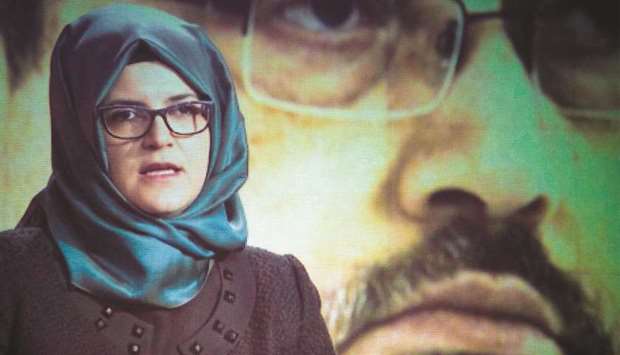I failed to call it. The day after Jamal Khashoggi disappeared, I told editors that the story, unfortunately, would not hold attention for more than two or three days, so jaded was I with how Saudi’s brutality had become normalised.
It is now more than a month since Khashoggi entered the Saudi consulate in Istanbul, never to be seen again, but his killing has scarcely been out of the headlines since. It has focused attention on Saudi Arabia in ways that activists, journalists, human rights organisers and politicians have desperately tried but failed to do for years.
This is not because Khashoggi was a journalist and that the media always raise the alarm for one of their own tribe. Numerous journalists have been killed or abducted whose stories never captured the press’s – never mind the public’s – attention like the death of Khashoggi. And it is not because he was particularly high-profile. He was certainly networked in media circles but was far from a household name.
He was also not an opposition leader. There are other, more outspoken, politically organised Saudis in political exile who were more likely targets for the royal family’s ire. His self-imposed exile raised eyebrows in the Arab world for those who follow the twists and turns of Saudi politics, but beyond that did not register on a wider scale. Despite his decamping to the US, Khashoggi was regarded as a friendly critic of the Saudi government who weighed his words carefully, never advocated regime change, and was in regular contact with senior members of the royal family. For someone who was really known only among the inner circles of politics and media, it made little sense that within days of his disappearance everyone, everywhere, seemed to be talking about him.
There was something about this event, something that landed in a way that no one could have anticipated. There was an element of shocking betrayal; to be murdered in one’s own consulate, a place of refuge in a foreign land, was akin to being murdered in a religious place. To be lured, then stung. It was a violation of amnesty that made it more sickening than if he had been liquidated randomly on the streets of Istanbul. It was reminiscent of Saddam Hussain’s amnesty to his two sons-in-law who had fled the country, only to be assassinated the moment they returned.
On the back of his murder, other atrocities committed by the Saudi regime have come into clearer focus. Arms deals with the kingdom are under greater scrutiny, with Germany halting future sales. The war in Yemen, which Saudi critics have been trying to call attention to for years, is suddenly higher up the agenda. Reporting from the ground has amplified the voices of doctors tending to starving children, incensed at how Khashoggi’s murder received so much of the airtime that they would be grateful for scraps of. “We’re surprised the Khashoggi case is getting so much attention while millions of Yemeni children are suffering,” a doctor told the New York Times. “Nobody gives a damn about them.” Last week, the US called for a “cessation of hostilities” in the Yemen war to be implemented within 30 days.
We cannot anticipate what horrors make an impact with the public and thus their governments. There is a certain spot, an intersection of moral abhorrence and personalisation, that unlocks sympathy and outrage. It is, of course, a failure that the world has not paid enough attention to the war in Yemen, but it is also a feature of human psychology, one that allows us to process the death of one known person, rather than millions of anonymous ones.
Jamal Khashoggi was the equivalent of the little girl in the red coat in Steven Spielberg’s Schindler’s List. The film was shot entirely in black and white, but a single girl was in colour, taken away from home with her family, playing in the mud in a concentration camp, and then piled up lifeless with other bodies on a cart. The technique identified the single story among millions, sharpening and humanising it to highlight what psychologists call “collapse of compassion”, our natural tendency to turn away from mass suffering.
It is why images of distressed individuals sear themselves in history’s eye, rather than all the mass of detail that is known about a war or a famine. It is why one individual can spark national uprisings, why the Tunisian vegetable seller Mohamed Bouazizi setting himself on fire unleashed passions across the Arab world, and why the trials of the thousands of incarcerated or tortured did not.
Rather than be dismissed as a fluke, a disproportionately indulgent treatment of a story centred on one member of the Saudi and media elite, the murder of Khashoggi is an opportunity, a martyrdom in fact, that should be pressed into the service of highlighting the callous and consistent brutality of the Saudi government towards its own people and its adversaries. It should also trigger a reappraisal of the cowardly realpolitik logic of security co-operation that Western allies invoke to justify appeasement that is, in fact, increasingly a threat to stability in the Middle East.
Already there is a different approach; more alarm. The death of two Saudi sisters who had sought asylum in the United States, found taped together in the Hudson river, is clearly receiving more coverage than would have been extended before the murder in Istanbul.
Khashoggi’s death may have been a tragedy, but it is possible that it helps the world to see all the rest of the Saudi government’s victims also as tragedies, rather than statistics, or collateral damage.

Why we can’t stop talking about Jamal Khashoggi
